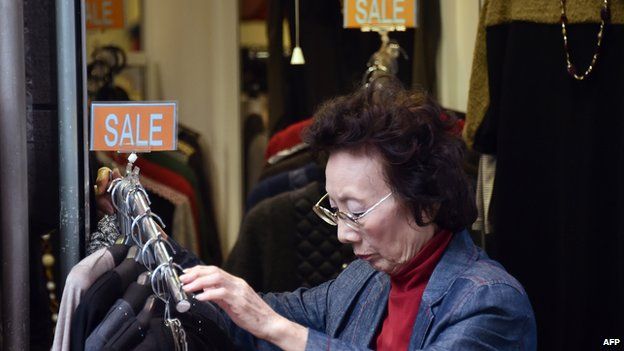Japan's economy makes surprise fall into recession
- Published

Japan's economy unexpectedly shrank for the second consecutive quarter, leaving the world's third largest economy in technical recession.
Gross domestic product (GDP) fell at an annualised 1.6% from July to September, compared with forecasts of a 2.1% rise.
That followed a revised 7.3% contraction in the second quarter, which was the biggest fall since the March 2011 earthquake and tsunami.
Economists said the weak economic data could delay a sales tax rise.
Sales tax delay
Prime Minister Shinzo Abe is widely expected to call a snap election to seek a mandate to delay an increase in the sales tax to 10%, scheduled for 2015.
The tax increase was legislated by the previous government in 2012 to curb Japan's huge public debt, which is the highest among developed nations.
April saw the first phase of the sales tax increase, from 5% to 8%, which hit growth in the second quarter and still appears to be having an impact on the economy.
The economy shrank 0.4% in the third quarter from the quarter previous.
The data also showed that growth in private consumption, which accounts for about 60% of the economy, was much weaker than expected.
The next tax rise had already been put in question by already weak economic indicators.
"The Japanese economy is in recession and has now contracted in three of the last four quarters," said Glenn Levine, senior economist at Moody's Analytics.
"The most likely course is now a snap election in December in which voters choose, naturally enough, to delay the tax increase."
Election expected
Speculation had been growing that the Japanese prime minister would call an election next month to gain support just two years after his election.
Local media are now reporting that Mr Abe could announce the next election as early as Tuesday to be held on 14 December.
The Japanese government's chief spokesperson Yoshihide Suga said on Monday that Mr Abe was expected to decide on various steps to take amid the "severe economic situation".
While Mr Abe's popularity has fallen since he took office in 2012, he is expected to win if an election were called, because the opposition remains divided.
In reaction to the negative economic data, the dollar went above 117 Japanese yen before settling back at 115.69.
The benchmark Nikkei 225 index, meanwhile, closed down almost 3% to 16,973.80, marking its biggest one-day drop since August.
Analysis: Rupert Wingfield-Hayes, BBC Tokyo Correspondent
Where did Abenomics go wrong?
In the spring of 2013, Prime Minister Shinzo Abe launched an ambitious growth strategy that rapidly became known as Abenomics.
Its aim was to drag Japan's economy out of 20 years of deflation and put it back on the road to growth. Billions of dollars were pumped into the economy through stimulus spending. The Bank of Japan went on an even bigger spree, printing hundreds of billions of dollars of new money and using it to buy government bonds.
This had two effects. First, it pushed down the value of the yen, which made Japanese exports cheaper. Second, it pushed investors out of bonds and in to stocks. The Tokyo stock market soared. By mid-2013 Japan's economy was back in what looked like solid growth.
Then, in early 2014, Mr Abe's government took a calculated gamble. With the economy growing he could risk putting up taxes for the first time in nearly 20 years. Consumption (purchase) tax would rise from 5 to 8%. The tax rise was urgently needed to plug the giant hole in Japan's public finances.
But the gamble has not paid off. Japanese consumers have stopped spending and the economy is back in recession. Why? The fall in the yen gave a huge cash windfall to Japanese exporters. But instead of increasing the wages of their employees, they have sat on the money.
The huge stock market rise only benefited a minority of rich people. 80% of Japanese people do not own any shares. Instead, their incomes are stagnant or falling, and the tax rise has made them feel even poorer. Hence they have stopped spending.
- Published17 November 2014
- Published31 October 2014
- Published19 July 2013
- Published26 July 2023